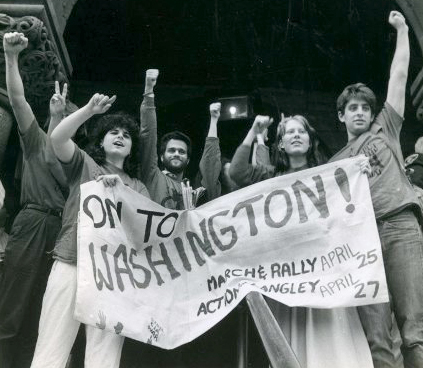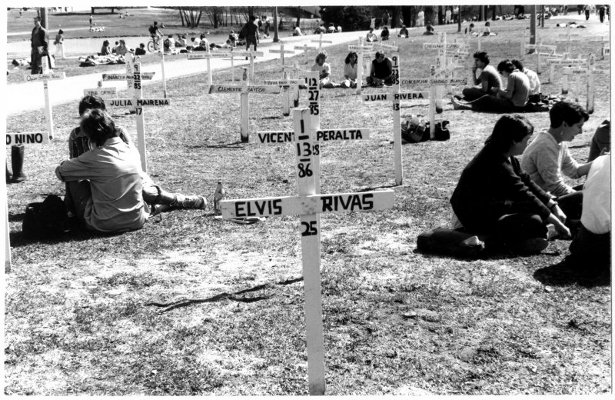
On Nov. 25, 1986, 60 people—including Amy Carter and Abbie Hoffman—were arraigned on charges of disorderly conduct stemming from a sit-in to block CIA campus recruiting at University of Massachusetts-Amherst, an act of protest of the CIA’s role in Central America. Howard Zinn testified as an expert on civil disobedience. Lawyers Tom Lesser and Leonard Weinglass defended Carter, Hoffman, and 13 other students who were brought to trial. Using the common law necessity defense (actions are necessary to prevent greater harm; there is no choice but to break the law to stop lawlessness/injury), witnesses for the defense included Howard Zinn and Daniel Ellsberg.
Zinn testified to the power of civil disobedience. Ellsberg testified to the circumstances of why he decided to release the Pentagon Papers. Carter testified to the importance of each of us taking a stand. She said, “Every time a person sacrifices himself for a larger injustice, it aids in the cycle of change.”

In his closing arguments, Weinglass said, “It’s not just a defense of necessity, their actions were not only necessary, their actions were needed, their actions were essential, and those actions were effective.” The defendants were acquitted on April 15, 1987.
Thanks to Tom Lesser and his office, we are pleased to present the following excerpt from Zinn’s testimony from April 10, 1987.
Excerpt from Testimony
. . . . do you have an opinion as to whether the actions that were taken by the defendants at the University of Massachusetts on November 24 would have an effect on United States foreign policy decisions?
A. No, this is a very complicated question.
THE COURT: Well, first of all answer the question.
THE WITNESS: To give a simple answer to a complicated question?
Q. (By Ms. Tomlinson) Just a simple one, do you have an opinion?
A. I do have an opinion.
Q. What is that opinion, Dr. Zinn?
A. My opinion is that this protest is bound to have some effect on American foreign policy.
Q. And on what is that opinion based?
A. The opinion is based on the fact, it’s based on my study of social movements and my experience in social movements and it’s based on the fact that the movements that effect government policy start with small actions and they consist of small actions. There’s no one big dramatic thing that changes government policy. When government policy changes it’s as a result of a lot of small actions of protest that take place that build up, that connect with one another and that eventually do have an effect on government policy, and that’s the relationship between – the reason I say it’s complicated is that the relationship between a few people protesting somewhere which seems small, and government foreign policy which is such a big thing, such an important thing and so powerful, the relationship at first seems like, well, what good could it do, but actually when you trace the changes that are made in foreign policy, when you trace, for instance, the decision to start negotiating out and getting out of Vietnam, you trace it back to thousands of small actions that took place, each one of which was a part of a chain reaction of incidents in which little groups of people took part, but it all added up to a very powerful movement which then had this remarkable effect in helping bring the United States out of that war. The same thing is true of the civil rights movement and the same thing is true of other movements, small actions grow, develop, and they have an effect on government policy.
Q. Now, Dr. Zinn, do you have an opinion as to whether or not the defendants who took these actions at the University of Mass. had any other viable way to affect foreign policy?
MS. PERNAD: Objection.
THE COURT: Finish the question first.
MS. TOMLINSON: I did finish the question and I asked him if he had an opinion.
THE COURT: I thought you hadn’t finished. Overruled.
THE WITNESS: Could you repeat that?
Q. (By Ms. Tomlinson) Do you have an opinion?
A. Could you repeat the question?
Q. Do you have an opinion as to whether or not the defendants who took the actions at the University had any other viable way to affect foreign policy?
A. I have an opinion.
Q. Could you tell us your opinion?
MS. FERNALD: Objection.
THE COURT: Overruled. Go ahead.
THE WITNESS: My opinion is that in the realm of foreign policy the ordinary procedures of government, that is voting, going to the polls, writing letters to your Congressmen, all of the things that we normally think are the way you get things done when you go through channels, well, it’s hard enough to do that in domestic policy and in fact so hard that in the case of black people and the case of other groups, they very often had to resort to protest movements in order to get something done because simply going to the polls and voting, simply writing a letter to your Congressmen, it just didn’t work. It wasn’t sufficient. That’s for domestic policy.
With foreign policy there’s no democratic mechanism really because in foreign policy, foreign policy is made mostly, almost completely, by the President and a small group of men around him. Even Congress doesn’t play a key role in foreign policy. I remember during the Vietnam War that a Catholic priest who was protesting against the war told me he had gone to Senator Kennedy and he was so anguished about the war and wanted Senator Kennedy to do something about the war.
THE COURT: That’s enough, Doctor. Wait a minute, please. Go ahead, ask the question.
Q. (By Ms. Tomlinson) I have one final question, Doctor. That is, in your opinion do you believe that the defendants’ actions would have an impact on University policy?
A. Well–
Q. Do you have an opinion?
A. Yes, I do.
Q. Would you tell us what that opinion is and briefly what it’s based on?
THE COURT: Is that within the realm of his expertise?
MS. TOMLINSON: He’s been certified as an expert in American history.
THE COURT: But not in administration of colleges and universities.
THE WITNESS: But certainly decision making.
THE COURT: Well, I don’t consider that in the physical process being administration of a college and it is not within the realm of his expertise to form that opinion.
MS. TOMLINSON: Could I have a moment, please?
THE COURT: Yes.
MS. TOMLINSON: Dr. Zinn, I have no further questions.
CROSS EXAMINATION BY MS. FERNALD:
Q. Good afternoon.
THE COURT: Side bar, please.
(Side bar conference)
THE COURT: The Jurors had a request just for you to speak louder. I didn’t want to say that in open court. All right.
(End side bar conference)
Q. (By Ms. Fernald) Dr. Zinn, you’re not suggesting that the only way to change government policy is to take over a building at the University of Massachusetts, are you?
A. I am suggesting—
Q. Would you please answer the question yes or no?
A. The only way to do it exactly is –
THE COURT: I will tell you what. You can be rehabilitated by counsel who brought you up. Ask the question again. Confine your response to the question that’s requested.
Q. (By Ms. Fernald) Dr. Zinn, you’re not suggesting that the only way to have an impact upon government policy is for a group of students at the University to enter a small administration building, are you?
A. Not the only way.
Q. And you’re not suggesting that the only way to change recruitment policy at a university would be to sit in front of buses, are you?
A. I doubt that you could change it without some sort of protest action, whether it is sitting in front of buses or something else, but it certainly wouldn’t be changed without people protesting.
Q. Would it be the only way?
A. No way is ever the only way.
MS. FERNALD: Thank you.
THE COURT: Thank you.
(Witness excused)
Learn more
- Read more about the University of Massachusetts Amherst case at Boston TV News Digital Library.
- View a film clip from April 15, 1987, outside the courtroom, inside the courtroom, and later in celebration of the “not guilty” verdict.
- View online slideshow, “Rhetoric or Research: The CIA at UMass.”



